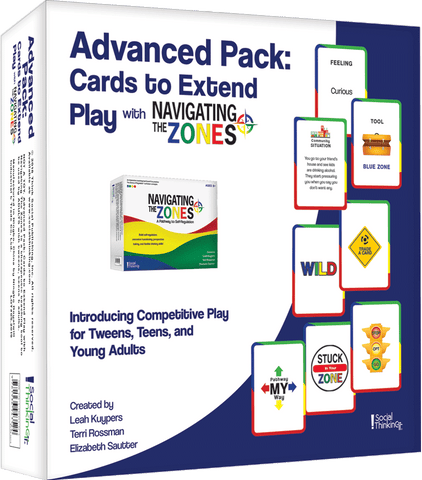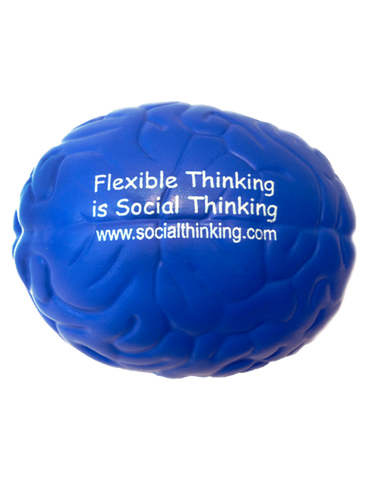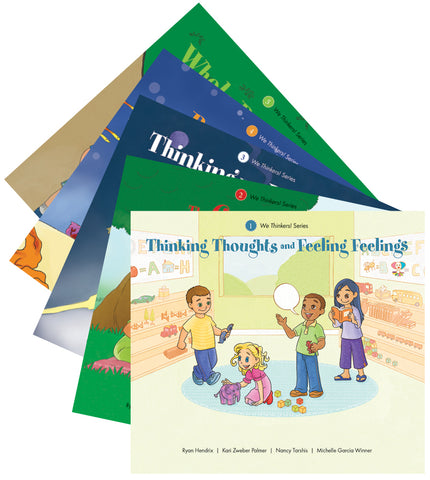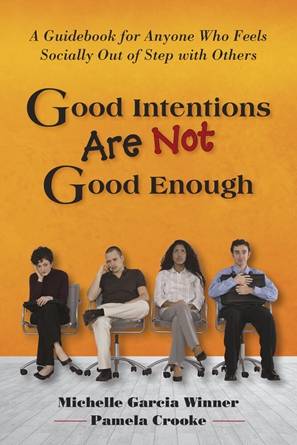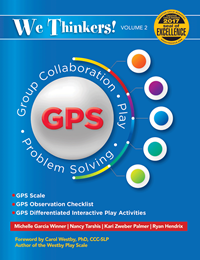
Group Collaboration Play (GPS) & Problem Solving Scale for Assessment
Important note: Teach the concepts first
The content in this book is exactly the same as the GPS book sold as part of the We Thinkers! Volume 2 Deluxe Package. We are making this book available for sale separately as an assessment tool, to people wanting to evaluate the peer-based play and reciprocal social engagement abilities in children with whom they work. The GPS book itself is not for teaching core Social Thinking concepts. The Volume 2 Package contains the materials and curriculum for doing that.
About This Book
Children play and socially engage with different levels of perspective taking, social awareness, and social problem solving abilities. Being able to assess these abilities in early learners ages 4-7 is an important first step in designing appropriate treatment programs to meet their needs.
While the GPS book was previously only available when purchasing We Thinkers! Volume 2 Deluxe Package, we are now selling it separately as a stand-alone tool to help professionals assess the social collaboration, social problem solving, and play abilities of these young learners.
- Professionals who work on assessment teams can access our GPS materials to use as part of their dynamic social assessment.
- IEP team members who are responsible for drafting a social skills/social learning treatment program find this information enables them to better understand where a student functions on the GPS, as a means for generating definable social learning goals and objectives.
- Researchers can use the GPS framework to analyze the effectiveness of the GPS as a scale to encourage stair-stepped treatment planning.
About the GPS
The purpose of the GPS is to identify a student’s interactive GPS level and related treatment strategies to foster growth. While having a basic understanding of the Social Thinking Methodology is always a positive thing when doing social assessments, the GPS Scale, observation tools and scoring materials are structured, organized, and presented in a way that prior knowledge of Social Thinking is not required.
The GPS scale assesses interactive peer collaboration and play using qualitative measures. It explores five levels of play (see below), with expanded discussions on each level and how the scale can be used flexibly. Also included is an overview of what peer collaboration and play look like across six domains of functioning; adults will observe children across these domains in completing their assessment. The GPS Observation tools, Observation worksheets and scoring sheets round out the materials used as part of the GPS assessment process. Finally, the book includes a rubric to measure interactive collaboration and play progress in the child.
Dedicated assessment tools include:
- GPS Scale. A criterion-referenced instrument designed to direct the observation of children at play along a five-level scale, with expanded discussions of each level:
- ME: Play Level 1
- ME + YOU: Play Level 2
- ME to WE: Play Level 3
- WE: Play Level 4
- SCIP (Shared Collaborative Imaginative Play): Play Level 5
- GPS Observation Checklist. Six guiding questions help the adult more closely observe the child’s behavior, with observation tips and expanded discussions of the concepts and questions at each of the five levels on the scale
- Does the child seek peers or adults as play partners in interactive play?
- How does the child use language during interactive play?
- What type of pretend play is the child using when interacting with peers?
- How flexibly does the child shift his or her play based on others’ ideas during interactive play?
- How well does the child problem solve during interactive play?
- Scoring tools include the GPS Observation Note-Taking Worksheet, GPS Checklist Scoring Sheets A-F, the GPS Observation Checklist Summary Scoresheet. Includes detailed discussion and advice on using the tools to determine a child’s GPS-Play Scale level.
- Chapter 7 connects observation and results to treatment planning and includes tips on creating activities to facilitate growth in play skills, using a structured format presented in the chapter.
From here, practitioners can match an individual’s ability level on the GPS Scale with appropriate activities and treatments of their choosing. For individuals using and teaching the Social Thinking Methodology, the accompanying materials in the We Thinkers! Volume 2 Deluxe Package provide the curriculum and materials for doing this teaching and treatment planning. The five Volume 2 storybooks each explore a Social Thinking Vocabulary concept, the Volume 2 curriculum book provides the instruction component for making these concepts come alive, and the remainder of the GPS book provides differentiated interactive play activities for four of the five levels of engagement outlined in the GPS Scale. (Note: the curriculum included in the GPS book requires students to already have been taught the five Social Thinking concepts presented in the Volume 2 storybooks and the units in the Deluxe Package curriculum book.)
Authors: Ryan Hendrix , Kari Zweber Palmer , Nancy Tarshis , Michelle Garcia Winner
- Ages: 4-7
- Format: Paperback
- ISBN: 9781936943364
- Published: 2018
